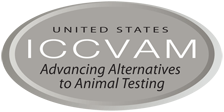About ICCVAM
The Interagency Coordinating Committee on the Validation of Alternative Methods (ICCVAM) is a permanent committee of NIEHS. Formally established in 2000 by the ICCVAM Authorization Act (42 U.S.C. 285l-3), ICCVAM is composed of representatives from U.S. federal regulatory and research agencies. These regulatory and research agencies require, use, generate, or disseminate toxicological and safety testing information.
The ICCVAM Authorization Act outlines the following purposes of ICCVAM:
- Increase the efficiency and effectiveness of U.S. federal agency test method review.
- Eliminate unnecessary duplication of effort and share experience among U.S. federal regulatory agencies.
- Optimize utilization of scientific expertise outside the U.S. federal government.
- Ensure that new and revised test methods are validated to meet the needs of U.S. federal agencies.
- Reduce, refine, or replace the use of animals in testing where feasible.
The ICCVAM Authorization Act named the 15 federal agencies originally represented on ICCVAM. Three additional federal agencies have joined ICCVAM since 2017: the National Institute of Standards and Technology, the Department of Veterans Affairs Office of Research and Development, and the National Center for Advancing Translational Sciences.
The ICCVAM document, “Validation, Qualification, and Regulatory Acceptance of New Approach Methodologies,” describes an approach to new approach methodologies validation that reflects modern toxicity testing, emphasizing integrating results from multiple in vitro and in chemico assays and in silico approaches. The document was developed by the ICCVAM Validation Workgroup with input from stakeholders. The document is also available in translation in Chinese, French, Japanese, Korean, Portuguese, and Spanish.
ICCVAM Activities
ICCVAM activities include:
- Facilitating interagency and international collaborations promoting the development, regulatory acceptance, and use of alternative tests that encourage the reduction, refinement, or replacement of animal test methods.
- Providing guidance to test method developers.
- Evaluating recommendations from expert peer reviews of alternative toxicological test methods and making recommendations on the use of reviewed test methods to appropriate federal agencies.
ICCVAM Leadership
Natalia Garcia-Reyero Vinas, Ph.D., ICCVAM Co-chair
Office of Chemical Safety and Pollution Prevention
U.S. Environmental Protection Agency
Suzanne Fitzpatrick, Ph.D., DABT, ICCVAM Co-chair
Human Foods Program
U.S. Food and Drug Administration
Warren Casey, Ph.D., DABT, ICCVAM Executive Director
National Institute of Environmental Health Sciences
ICCVAM Biennial Report
The ICCVAM Authorization Act of 2000 directed ICCVAM to prepare a progress report on its first anniversary and every other year thereafter. The latest ICCVAM Biennial Progress Report describes ICCVAM and ICCVAM agency activities from January 2022 through December 2023.
The report highlights ICCVAM member agency activities supporting toxicology innovation, as well as regulatory agency initiatives to promote the 3Rs (replace, reduce, or refine animal use) and to provide information about the use of new approach methodologies. Key ICCVAM, ICCVAM agency, and NICEATM accomplishments summarized in the report include:
- Development of an updated document on “Validation, Qualification, and Regulatory Acceptance of New Approach Methodologies,” by the ICCVAM Validation Workgroup.
- Publication of articles describing U.S. and international information needs and testing requirements for nanomaterials, ecotoxicity, and acute systemic toxicity. An ICCVAM workgroup also published an award-winning article describing federal agency application of in vitro to in vivo extrapolation.
- Curation and publication of a human skin sensitization database.
- Broadening applicability of defined approaches for skin sensitization.
- Establishment of an ICCVAM workgroup to provide expertise in identifying and evaluating NAMs to predict toxicity of per- and polyfluoroalkyl substances (PFAS).
- Expansion of the Integrated Chemical Environment, and descriptions of web tools and data resources for chemical exploration and toxicity prediction provided by NIEHS, the U.S. Environmental Protection Agency, and others.
In the website edition of the Biennial Report, menu items allow users to view articles by agency or find articles relevant to topics such as in vitro to in vivo extrapolation, cardiotoxicity, or mixtures toxicity. Reference pages list publications of interest as well as providing glossary terms and acronyms relevant to ICCVAM agencies and activities.
Strategic Roadmap
In January 2018, "A Strategic Roadmap for Establishing New Approaches to Evaluate the Safety of Chemicals and Medical Products in the United States" was published. ICCVAM coordinated development of the strategic roadmap, a resource to guide U.S. federal agencies and stakeholders seeking to adopt new approaches to safety and risk assessment of substances.
ICCVAM's Stakeholders
ICCVAM relies on stakeholders to carry out alternative test method research, development, and validation studies. These stakeholders include:
- U.S. federal agencies that generate, require, or use toxicological data.
- Agencies within governments of other countries that use or generate toxicological data.
- Researchers and IACUC members in companies or research institutions that perform toxicological testing.
- Companies that develop toxicological tests.
- Animal welfare organizations.
- Consumer protection organizations.
- The public.
ICCVAM facilitates international collaboration on the development of alternative test methods through its membership in the International Cooperation on Alternative Test Methods and participation in the Test Guidelines Programme of the Organisation for Economic Co-operation and Development.
As a permanent committee of NIEHS, ICCVAM falls under the National Toxicology Program Interagency Center for the Evaluation of Alternative Toxicological Methods (NICEATM).
The Scientific Advisory Committee on Alternative Toxicological Methods (SACATM), a standing NTP advisory committee, provides additional advice and guidance. SACATM members include stakeholders from regulated industries, animal protection organizations, academia, U.S. state or international regulatory bodies, and companies or organizations that develop, market, or use test methods.


